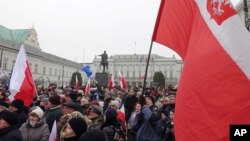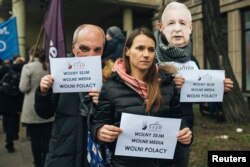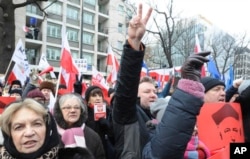Poland's lower house of parliament lifted a temporary ban on media access Tuesday in an effort to defuse anti-government protests that have paralyzed the assembly, but the opposition said more still needed to be done.
The clampdown on media access planned by the ruling right-wing Law and Justice (PiS) party is among a raft of measures its critics say have eroded the independence of the media and the judiciary. Fears of an authoritarian drift in Poland have brought thousands of protesters onto the streets in the past year and alarmed the country’s European Union partners, though the government remains broadly popular among Polish voters.
Despite the removal of the media ban, opposition lawmakers extended their occupation of parliament's debating chamber into a fifth day.
They vowed to stay put until a debate and vote on the 2017 budget they say was held illegally in a side room Friday to avoid protests and reporters is re-run with all lawmakers.
The planned curbs on media access to the Sejm announced last week by PiS Speaker Marek Kuchcinski triggered demonstrations outside parliament and an occupation of the Sejm's podium and the speaker's chair by opposition lawmakers.
In response, Kuchcinski temporarily barred all reporters and moved the vote to a side room.
The Sejm's press office said Tuesday the ban had been scrapped but rules on media access were still likely to change.
That was an allusion to an earlier proposal to reserve all recording of parliamentary sessions for five selected TV stations and limiting the number of journalists allowed in parliament to two per media outlet.
"We want, however, to give an assurance that these changes will not be introduced without broad consultations and agreements with reporters," the press office said.
The opposition welcomed the move but demanded the lower chamber also re-run the disputed budget vote. PiS officials replied that the vote was legal and would not be repeated.
Budget problems?
"PiS is retreating," the leader of the liberal Nowoczesna party, Ryszard Petru, said on his Twitter account. "Another debate on the budget is a key issue."
The deputy speaker of the upper house Senate said the situation could lead to problems with Polish debt issuance.
"If there are doubts around the budget, there will be doubts regarding the purchase of debt paper [by investors]," said Bogdan Borusewicz of the opposition Civic Platform.
The standoff in parliament is the most serious for years in Poland and marks the sharpest escalation in tension between opposition parties and PiS since it won an October 2015 election with a large majority.
Spreads in Polish 10-year bond yields over those of Germany's have risen by 81 basis points in the last 12 months to 3.16 percent amid uncertainty over the policy plans and increased borrowing needs of the new government.
Poland's borrowing needs are to rise next year to 79 billion zlotys ($18.54 billion) from almost 65 billion zlotys expected in 2016 as PiS boosts social spending programs.
The eurosceptic PiS has promised a return to patriotic and Roman Catholic values in public life and a tougher stance toward the EU and historical adversary Russia.
The government has placed state media and prosecutors under its direct control, passed legislation making it more difficult for the constitutional court to issue verdicts and approved a bill critics say will limit freedom of assembly.
European Commission President Jean-Claude Juncker has put the question of Poland's media restrictions on the agenda of Wednesday's meeting of the EU's executive.
The government's moves have alienated many liberal-minded urban Poles, but its voter base in small towns and rural areas has remained supportive, thanks to a generous child benefit scheme and rises in the minimum wage that have helped to ease poverty, as well as cuts in the retirement age.







